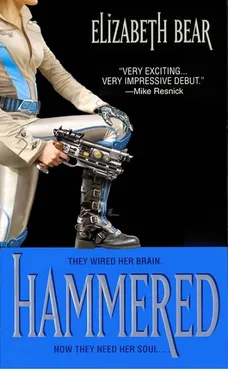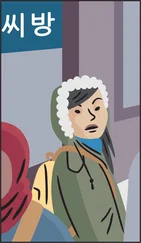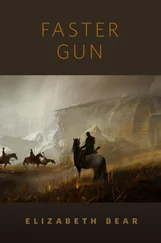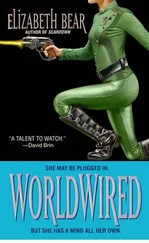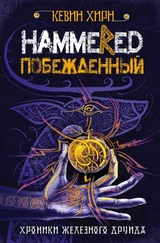Barb dropped her gun and dove at the smaller woman. Yee tried to sidestep, but the water slowed her down, and Barb wrapped long wiry arms around her, feeling Yee twist and bring her knee up, shouting. A shattering noise filled the tunnel as Barb shoved her under, and under the claxon wail, as if far away, Barb heard the big gangster shouting frantically.
“Bobbi, get out, get back here!”
Barb looked up. Something billowed toward her, red-lit in the flasher like the smoke from Hell. Yee punched her in the stomach and bobbed to the surface, turning as well to see what was bearing down on them.
The Hartford Steam Plant vents sent pressurized, super-heated vapor at temperatures in excess of seven hundred degrees into the north channel of the buried Park River. Neither woman had time to feel much pain.
Even as he shouted, Razorface knew the warning came too late. He dove straight under the river, the water closing over his head warm as blood. He dropped his pistol and swam strongly with the current, kicking hard enough that even dulled with cold, white agony lanced up his leg. He swam until the breath seemed to swell in his throat, bubbling out between his teeth with a will.
Then he clung to the iron loops until black spots swam in front of his eyes, warm water rolling over his body. He half expected the bodies of the two women to strike him, but they must have floated higher in the river. At last he thought the water cooled, and he let go of the rungs and kicked toward the surface.
He coughed hard on his first lungful of air, sweet and cold and full of the scent of the storm: saltwater and strange shores.
It was midmorning by the time Razorface hobbled to the door of Jenny’s shop and keyed himself inside. He set the alarms, armed the security, and left the ruins of his clothes in a puddling pile on the floor. The storm had passed.
He stripped back the military-taut blankets on her cot, collapsed on the bed, and pulled them over himself. He only woke once, when Boris curled purring between his shoulder and his neck.
Probably late afternoon, the middle of September, 2062
National Defence Medical Center
Toronto, Ontario
They tell you the body can absorb a surprising amount of punishment. That the brain is hardwired to forget pain. That time dulls the memories and smoothes the rough edges, that the keen edge of the blade blunts with the passage of years. But for me, the memories have stayed sharp as if honed. Nine months in a hospital bed and twelve months of physical therapy. Two hundred and seventeen hours of surgery. Fear, and overcoming it.
Some of the fear, anyway. I promised myself that I would never pass this way again. And here I lie, eyes covered, face wrapped in cool gauze, body numb and distant. Sedated, pain managed, not quite anesthetized. Pins and needles. I can’t feel the straps immobilizing my limbs, the padded blocks holding my head in place.
The left side of my face feels… funny. There’s an odd sort of pressure in the eye socket, which is why I can’t check the time on my heads-up. The nanosurgeon bots haven’t yet linked the new prosthetic to my brain, and even if they had, it’ll be some time before my visual cortex learns to process the data. Children born blind can’t ever do it. You have to learn to see, and there’s a window of time when you do that or your brain never develops the ability.
Under my skin, deep inside my central nervous system, along the synapses of my brain, microscopic machines are implanting cultured oligodendrocytes, reversing the myelin-sheath breakdown along my neural pathways, disassembling the creaking old wetware threaded through my brain and CNS, grafting pluripotent stem cells into a collagen base to replace nerve tissue lost to injury and to scarring. Tangles of denatured myelin clogging my synapses — destroyed by electrical overload — will be consumed. Other single-minded nanosurgeons gnaw away collagen-rich scar tissue in my skin and elsewhere, providing raw materials for the reconstruction while grafting in new, fresh cells. Bone, tendon, muscle — all can be mended now.
Still more machines construct smaller and tighter nanoprocessors against the inside arch of my spine — far more protected than the old, which are to be consumed as part of the process. There will be minor additional surgery to implant linkages — sockets, essentially, where I can be wired into the virtual reality equipment.
Once remyelination commences, theoretically, I’ll be good as new.
Better, in fact.
Faster than I was, without the overload side effects. Able to move without pain. Free of the flashbacks and the dreams. Unless, of course, something goes catastrophically wrong.
There’s no more than a 30 percent chance of that.
I never wanted to know this much about neurology.
For twenty-five years, I’ve lived with disfiguring scars, out-of-date technology, clunky hardware, and inadequately managed pain. Because I couldn’t face it again. Couldn’t face this again.
So here I lie in darkness.
And time passes.
And as minute fingers pick through the stuff of my soul, I dream.
Some of them are even pleasant.
I dream I stand over Nell’s coffin in my brand-new dress greens: cheap coffin, copper-colored with brushed steel trim, innocent of flowers. When your younger sister dies by drowning, even the Canadian Army grants compassionate leave so you can go home for the funeral. For the first time in my life, in that dream, I know I am going to die.
Fine rocky red clay trickles between Barb’s fingers, spattering the lid. I imagine from the inside, it must sound like falling rain.
I am sixteen years old. It’s December. The sound of earth on that coffin lid scares me down to my boots. It’s worse than the sound of Chrétien cocking a gun shoved into my mouth.
Even when I tasted gun oil and cordite, I knew Chrétien wouldn’t kill me. He was just trying to scare me, to put the fear of him in another teenage girl. He knew how; it worked. But I never thought he would kill me.
But that’s Nell Barb is scattering dirt over, tears streaking her mascara down her face, black suit immaculate. Nell, my little baby doll.
Nell. Somebody else I couldn’t save. And if I couldn’t save her, I know there’s no way in hell I can ever save myself.
It’s the oldest dream and the worst one, and just like always, I know I am going to die.
“I never should have let her take her life jacket off,” Barb says at last, raising her tear-streaked face to mine. “She must have hit her head when the canoe capsized. There was nothing I could do.”
Her eyes are wide and horrified, and I swear I would believe her. Just as everybody else must. If I didn’t remember with lenslike clarity the way she threw me out of that same damned canoe when I was five and she was twelve, I’d probably even believe her.
She reaches out to me, dirt staining the palm of her hand rusty. I knock it aside. “Je sais ce que vous avez fait,” I hiss, too low for Father Oestman to hear. “Je vous verrai dans l’enfer.” I’ll see you in Hell. I never called her tu . Not from a little girl. I never called Chrétien tu, either.
Make of it what you will.
“You don’t know anything,” my sister says. “You can’t prove anything at all.”
But I can prove something now.
The nurses come and go, muddy and distant through a tranquilizer haze. Their hands are cool and efficient. They change the dressings and speak in low, calm tones. I think I mumble responses, but I cannot quite be sure. Sometimes it seems like days between their visits, and sometimes they come three right in a row, as if overlapped.
Читать дальше
